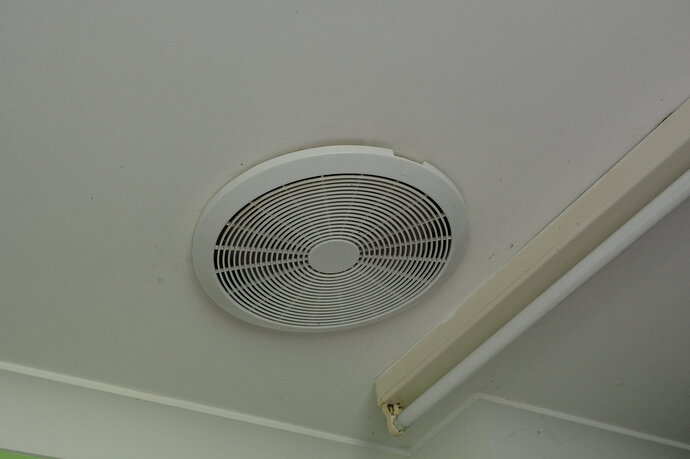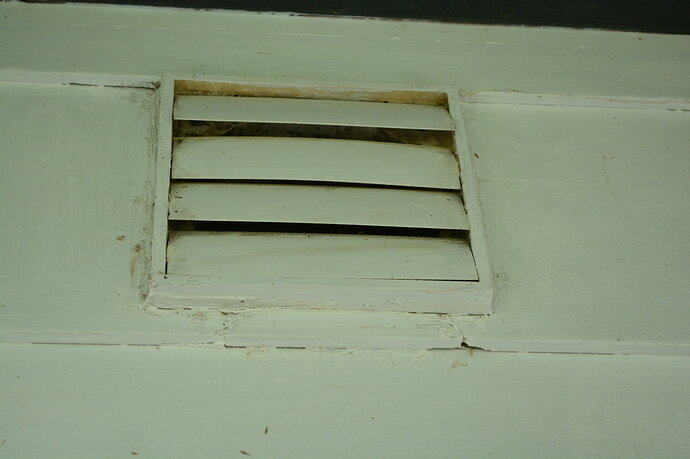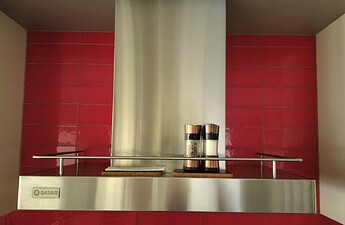Hello Choice members,
We do a lot of cooking, several times a day in my tiny kitchen. I have an Omega rangehood flued outside and the amount of grease I wash out of it on a regular basis shows that it does work. However it simply isn’t enough. There is a fine coating of grease on all the surfaces in my kitchen/dining/lounge area.
I am hoping to put a ceiling exhaust fan in that I can place as an extra in my kitchen area and flue it outside, but I am at a loss as to what I can buy.
Any suggestions for a grease extractor fan?
A Choice buying guide that includes a link to the [subscriber only] review that includes retracting (6), undermount (31), and wall canopy (27) ducted styles.
A regular exhaust fan would accumulate grease so whatever you install needs a grease filter, and one that can easily be cleaned. Since your problem seems to be an insufficiently powerful Omega, replacing it would probably be the best way forward. Adding one anywhere would require it to pull air from the cooktop area, that would reduce effectiveness.
Alternatively have you considered how you cook? It might help to use less fatty oils or lower temperatures.?
I have one in the ceiling over the wall oven that is flued to the outside. It is a 30cm round grill with a very powerful motor above it. It is there as the oven produces much smoke and grease especially when grilling or roasting but it also clears the whole room.
The one I have is loud (powerful fans are like that) but very effective. It is not a commercial unit but one I put together as I could not find a commercial one that was suitable. Mostly they try to be quiet and sacrifice effectiveness.
The fan has a reducer from 30 to 15cm which allows me to use 15cm flexible ducting, 30cm ducting would be better but it is too hard to get outside as the soffit outside the wall is not that wide. The alternative is a stack with a hat on it that goes straight up through the roof instead of out through the wall, this will gain efficiency by being 20 or 30cm diameter all the way and a shorter straighter pipe but it has to be flashed into the roof. You can get them with the motor built in.
Another way to reduce the noise and maintain power, if you want to go to the trouble and expense, is to have the motor on the outlet end of the flue outside the house but that was too much trouble for me at the time. You can buy such systems off the shelf but there will be some installation.
Whichever way you go the cost of the gear and installation for a flued system will be quite a bit more than your standard low speed ceiling exhaust fan that exhausts straight into the roof cavity. The idea of filling the roof with grease does not appeal to me, the cockroaches have enough feed as it is.
From experience of both types, my recommendation is a ducted rangehood with ‘baffle’ rather than mesh filters. The former do a very good job of trapping grease, and are easy to clean. I would also go for an external motor unit if that’s an option. These make the rangehood genuinely quiet.
We have a Whispair Monte Carlo 60 that was installed in March 2019 to replace an unbearably noisy, inefficient, and falling apart after ~7 years Omega undermount rangehood.
We find the Whispair quiet and efficient - a welcome change from the Omega, which we hated from the start. When we renovated our kitchen in 2012, there was very limited choice of 600mm undermount rangehoods that would fit into a standard over-benchtop wall cupboard … well, in fact, there was only one actually available when we needed it, the wretched Omega. ![]()
The Whispair’s external motor unit on the roof is also quiet - that is, it’s not just transferring the noise outside where it’ll annoy the neighbours.
Its grease extraction is very much better than the Omega’s ever was. There’s been no grease build up anywhere around the cooktop or under the wall cupboard since we got the Whispair.
I don’t see how that works. The oil has to be the right temperature for the outcome the cook wants, if too low it isn’t going to get the result.
What are these less fatty oils you speak of? All the oils that I have are same amount of fatty, that is 100%. A little water in your oil will promote splattering not reduce it.
Not getting into cooking class, but I eventually learned one can get the same results on a lower heat with less smoke, and there are differences in smoke characteristics between say the EVO, canola, rice bran, and peanut oil I regularly use.
I once did a pork belly that smoked the kitchen and the oven, requiring significant effort to clean up. Next time I used less oil, got almost no smoke, easy cleanup, and as great a pork belly as the first go. Same experience frying; it took me a while to work it out but lower heat works most of the time with less spatter and less smoke and takes but a few minutes longer. Sometimes something needs very high heat to sear but that can still be done with less oil than one might be used to.
A ‘little’ water in the food that is put in the frypan (eg recently washed broccolini or green beans, etc) will do the same. How about moisture laden wet potatoes dumped into a hot oil bath? Nasty!
This is likely to have limited effect. In a well sealed house, it could make the situation worse as the two fans (rangehood and extraction) could be fighting against one another, reducing efficiency of the rangehood.
Oils are suspended in the air when cooking is done. The only way to get rid of the oils is to ensure that air containing oil within the kitchen is captured and exhausted to the outside. As you have an existing rangehood, its fan and placement won’t be removing all air from the cooking area. This means fugitive emissions will be bypassing the rangehood, thus allowing oil to accumulate on surfaces within the kitchen.
If kitchen surfaces are getting sticky with oil, this will be unburnt oil which has volatised into the air. It condenses on cool surfaces (which is almost every surface within the kitchen). It won’t be cooking smoke as this will be particulates and won’t leave a oily film. Smoke particulates will be a black dust or soot on surfaces.
Adding a standard domestic style exhaust fan on the ceiling is only likely to remove air containing oil from the area immediately around the exhaust fan. This means that in other areas of the kitchen oil will continue to settle.
If your house well sealed, the rangehood may not be working as efficiently as it is designed to do. If you open an external window or door, this will allow the better flow of air through the house/kitchen and hence through the rangehood to the outside. Likewise opening external windows/doors either side of a kitchen to allow air flow through the kitchen when cooking may also assist.
Commercial kitchens use large apron around their cooking areas with extraction fans with a high air movement volumes to try and exhaust all emissions from within the cooking area. Such can be difficult to achieve in a domestic kitchen.
I personally would be looking at your existing rangehood and ducting to see if there is a way to make it more efficient and/or replace with a larger sized canopy and higher extraction volumes. This may significantly reduce the amount of oil accumulating on kitchen surfaces, but won’t remove it completely (it will be extend the periods when the kitchen need as good clean).
If it is a big concern, there are specialist kitchen exhaust specialists which could be engaged for advice.
Thanks for the advice. Do you remember the bands you used. And would it be an terrible imposition to send me a photo?
Thank you Syncretic. Do you recall the brands you used? Would it be a terrible imposition to attach a photo please?
Thanks so much Isopeda. With very limited space, I will look into this one. The noise of the Omega is pretty over the top. Really appreciate your suggestion.
There are other brands that have similar offerings - Bosch and Schweigen are two I can think off offhand - so you might have a wider range to choose from than we had. In 2019 the choice was between Whispair and Schweigen for hoods that would meet the size requirement, ie would fit into the above-bench wall cupboard where the Omega was.
I don’t recall whether the Schweigen had an external motor option, but I had decided that was an essential criterion, because we really did not want another noisy hood.
I was able to buy directly from Whispair, with free delivery. We engaged a local company that could fit the rangehood and do the minor cabinet work needed to fit the new hood where the old one had been.
This worked out well. Whispair were good to deal with, and delivery was prompt.
Sorry I don’t recall the brand of the fan and it is in the ceiling as is the ducting and reducer. It was intended for use in hothouses, it would be called an inline fan I think.
Here are the external bits:
The re-purposed grill.
The outlet shutter which is on the veranda.
Baffles vs mesh filters. One manufacturer’s advice.
We have a largish kitchen area with high ceilings. Approx 110 m3. Far better to exhaust at the source. Effectively clearing vapour unlikely once it’s in such a large air volume with 2 ceiling fans and a split RC on the far wall. Consider also the impact on the AC especially in summer and the added water content of the outside air (climate zone dependant).
For inspiration of what’s possible another manufacturer with numerous design choices.
P.S.
We have a Miele slide out under mount that exhausts directly through an external vent. Even so we avoid cooking that creates oil smoke and attempt to minimise splatter. For serious roasts etc it’s the Weber gas hooded BBQ on the kitchen deck.
Some of which doesn’t coincide with my personal experience of both types.
They say that baffles cons include
- May be noisier than mesh filters
- May drip oil if not cleaned well
My experience:
-
Our Whispair’s quieter than any mesh filter hoods I’ve ever used. Mesh filters are also light and inclined to rattle, which is an irritating extra noise. But perhaps Schweigen rangehood models that can have either mesh or baffle filters are noisier with baffle than with mesh.
-
The Whispair has never dripped oil, but all mesh filters I’ve had anything to do with did, especially if not cleaned very well and very often (eg in a share house). I think the baffle channels would have to be full of oil for it to drip. Cleaning would have to be seriously neglected for this to happen.
They say that mesh filter pros include
- Captures more fat/oil particles
which, again, is not my experience. Maybe they do technically hold more oil/fat - but if so they don’t hang on to it! ![]()
We have a 2011 vintage Qasair 90cm dual motor. It can be loud but not because of the motors. The airflow through the grease filters makes more noise than the fans.
We had a quizzical issue with it a decade on and the gents who came were awesomely thorough and found a wire in a connector that had become intermittent. They also did a ‘full service check’. The cost was very modest and very high value for services rendered.
I would recommend Qasair without reservation.
Not in my case. My house is very well sealed and there is no detectable interaction between the two. The flow from each when both are on is indistinguishable from when the other is not on. I do not have any measuring equipment but I can observe the height of the exit shutters and the effect on a smoky room. The latter is the problem to be solved. Empiricism is always limited by observational equipment.
Opening the kitchen window does help as it gives crossflow and moves air only within the room rather than draw it in the door. This is at cross purposes with having well sealed house to accommodate aircon but in life compromise is required.
They certainly do have external options, Rangehood Motors | Schweigen Isodrive® Motors, it’s a big selling point for them that it is external.
Brochure from Schweigen about their choices
https://www.schweigen.com.au/brochures/schweigen-brochure
No, I don’t have one nor am I affiliated with them but have in the past looked at them and like the designs.
The best ever Tough Grease Cleaner I ever found is Richard’s Grease Cleaner-a bit expensive but very powerful and best ever results for these Exhaust Filter Cleaners and other greasy items.
Only sold online can Google to research if suitable that is something to consider and will be quite content
Our range hood, which was there when we bought the home, did not adequately remove steam and smoke from the cook top. We engaged an electrician to install a second extractor fan between the ducting and the vent on the external wall.
We have a seperate switch for the second fan installed on a powerpoint. This enables us to boost the extraction when needed. It has served us well.


